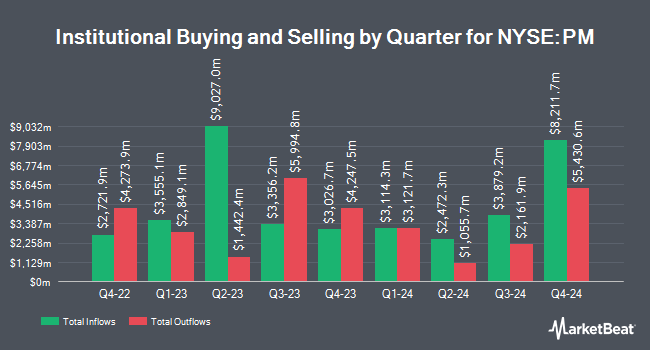Oppenheimer Asset Management Inc. cut its stake in Philip Morris International Inc. (NYSE:PM - Free Report) by 19.6% in the first quarter, according to its most recent disclosure with the Securities and Exchange Commission (SEC). The institutional investor owned 201,026 shares of the company's stock after selling 49,119 shares during the period. Oppenheimer Asset Management Inc.'s holdings in Philip Morris International were worth $31,909,000 as of its most recent filing with the Securities and Exchange Commission (SEC).
A number of other hedge funds and other institutional investors have also modified their holdings of the stock. JFS Wealth Advisors LLC raised its stake in Philip Morris International by 4.9% during the first quarter. JFS Wealth Advisors LLC now owns 4,761 shares of the company's stock worth $756,000 after purchasing an additional 223 shares during the period. Spinnaker Investment Group LLC increased its holdings in shares of Philip Morris International by 7.1% during the 1st quarter. Spinnaker Investment Group LLC now owns 2,139 shares of the company's stock worth $340,000 after buying an additional 141 shares during the last quarter. M3 Advisory Group LLC acquired a new stake in shares of Philip Morris International during the 1st quarter worth approximately $245,000. TrueMark Investments LLC raised its position in shares of Philip Morris International by 31.5% during the 1st quarter. TrueMark Investments LLC now owns 66,089 shares of the company's stock valued at $10,490,000 after buying an additional 15,826 shares during the period. Finally, Ridgecrest Wealth Partners LLC lifted its holdings in Philip Morris International by 4.3% in the first quarter. Ridgecrest Wealth Partners LLC now owns 4,851 shares of the company's stock valued at $770,000 after acquiring an additional 200 shares during the last quarter. 78.63% of the stock is owned by institutional investors and hedge funds.
Philip Morris International Price Performance
Shares of NYSE PM traded up $1.89 during midday trading on Monday, hitting $185.18. The company's stock had a trading volume of 4,306,509 shares, compared to its average volume of 6,132,364. The firm has a market capitalization of $288.24 billion, a price-to-earnings ratio of 38.18, a price-to-earnings-growth ratio of 2.66 and a beta of 0.52. The business's fifty day simple moving average is $173.82 and its two-hundred day simple moving average is $151.27. Philip Morris International Inc. has a 1 year low of $99.86 and a 1 year high of $186.69.
Philip Morris International (NYSE:PM - Get Free Report) last issued its quarterly earnings results on Wednesday, April 23rd. The company reported $1.69 EPS for the quarter, beating the consensus estimate of $1.61 by $0.08. Philip Morris International had a net margin of 8.43% and a negative return on equity of 122.40%. The company had revenue of $9.30 billion during the quarter, compared to analysts' expectations of $9.10 billion. During the same quarter last year, the company posted $1.50 EPS. The firm's revenue was up 5.8% compared to the same quarter last year. Analysts anticipate that Philip Morris International Inc. will post 7.14 EPS for the current fiscal year.
Philip Morris International Announces Dividend
The business also recently declared a quarterly dividend, which will be paid on Tuesday, July 15th. Shareholders of record on Friday, June 27th will be given a $1.35 dividend. This represents a $5.40 dividend on an annualized basis and a yield of 2.92%. The ex-dividend date of this dividend is Friday, June 27th. Philip Morris International's dividend payout ratio is currently 111.34%.
Analysts Set New Price Targets
Several research firms have issued reports on PM. Barclays reissued an "overweight" rating and set a $220.00 target price (up previously from $205.00) on shares of Philip Morris International in a research note on Friday, June 13th. Stifel Nicolaus increased their price target on Philip Morris International from $168.00 to $186.00 and gave the stock a "buy" rating in a report on Thursday, April 24th. UBS Group upgraded shares of Philip Morris International from a "sell" rating to a "neutral" rating and boosted their price objective for the company from $130.00 to $170.00 in a report on Friday, April 25th. Wall Street Zen raised shares of Philip Morris International from a "hold" rating to a "buy" rating in a research report on Saturday. Finally, Needham & Company LLC began coverage on shares of Philip Morris International in a research note on Thursday, May 22nd. They set a "buy" rating for the company. One analyst has rated the stock with a hold rating and eleven have assigned a buy rating to the company. Based on data from MarketBeat, Philip Morris International has an average rating of "Moderate Buy" and a consensus price target of $176.80.
Get Our Latest Research Report on PM
Philip Morris International Company Profile
(
Free Report)
Philip Morris International Inc operates as a tobacco company working to delivers a smoke-free future and evolving portfolio for the long-term to include products outside of the tobacco and nicotine sector. The company's product portfolio primarily consists of cigarettes and smoke-free products, including heat-not-burn, vapor, and oral nicotine products primarily under the IQOS and ZYN brands; and consumer accessories, such as lighters and matches.
Read More

Before you consider Philip Morris International, you'll want to hear this.
MarketBeat keeps track of Wall Street's top-rated and best performing research analysts and the stocks they recommend to their clients on a daily basis. MarketBeat has identified the five stocks that top analysts are quietly whispering to their clients to buy now before the broader market catches on... and Philip Morris International wasn't on the list.
While Philip Morris International currently has a Moderate Buy rating among analysts, top-rated analysts believe these five stocks are better buys.
View The Five Stocks Here
Discover the 10 Best High-Yield Dividend Stocks for 2025 and secure reliable income in uncertain markets. Download the report now to identify top dividend payers and avoid common yield traps.
Get This Free Report
Like this article? Share it with a colleague.
Link copied to clipboard.